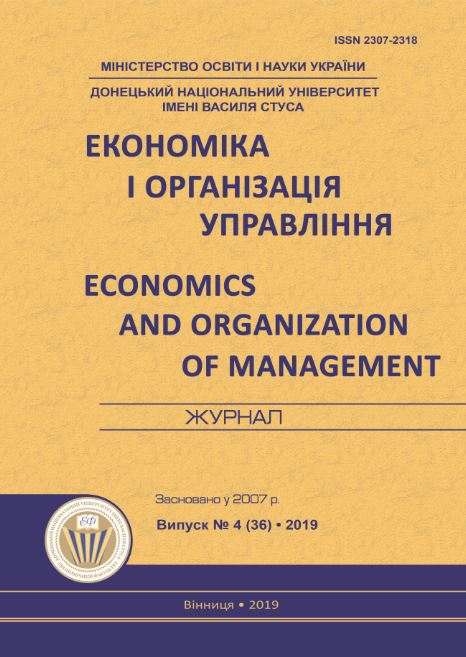Creating innovative active co-creation environments: organizational and managerial aspects.
DOI:
https://doi.org/10.31558/2307-2318.2019.4.1Keywords:
innovative active environment, collaboration, co-evolution, involution, crowdsourcing, crowdfunding, stakeholder, suprasituational activityAbstract
The key idea that actualizes the need to use innovatively active co-creation environments is the need for a balanced, non-linear reaction of business entities to the increasing complexity and uncertainty of market processes in the context of the implementation of sustainable development imperatives. The aim of the article is to develop scientific and practical recommendations aimed at systematizing and explicating organizational and managerial aspects of the formation of innovatively active co-creation environments. The systematization and explication of the key factors of the assembly of an innovatively active polysubject is realized through analysis and generalization of theoretical and empirical constructs of the collaboration process. The process of forming innovatively active co-creation environments is presented and substantiated using a descriptive approach. The analysis of the organizational and managerial aspect of the process of formation of innovatively active environments of co-creation. As a result of which a list of potential stakeholders of the co-creation process is explicated, key behavioral triggers (interests, needs) that initiate the mechanism of joint creativity are structured. The work systematizes the main behavioral characteristics of the participants in the process of joint creativity, recommendatory accents of an organizational and managerial nature. A basic separation of existing forms and types of co-creation has been implemented, with their subsequent substantial and semantic filling. It is summarized that, under the current conditions, the artificial isolation of the innovation activity of an enterprise from the external environment determines the low congruence of its results. The considered co-creation mechanisms, for the most part, have the character of a palliative means that relieves the primary tension between the enterprise and the market, which need their further development and improvement. Nevertheless, this form of interaction allows us to identify the main trends in organizational and managerial transformations associated with the need to ensure the hierarchy, openness, and symbiotic nature of the internal processes of the enterprise, in order to form the constructive premises of its native co-evolution with the external environment.References
Кастельс М. Информационная эпоха : экономика, общество и культура / М. Кастельс. – Пер. с англ. – М. : ГУ ВШЭ, 2000. – 606 с.
Безгин К.С. Управление процессом создания ценности на предприятии: полисубъектность и коллаборация: монография / К.С. Безгин. – Харьков: «НТМТ», 2015. – 288 с.
Лидбитер Ч. Мы – думаем : Массовые инновации, не массовое производство / Ч. Лидбитер. – Пер. с англ. – М. : Аквамариновая книга, 2009. – 264 с.
Рифкин Дж. Третья промышленная революция. Как горизонтальные взаимодействия меняют энергетику, экономику и мир в целом / Дж. Рифкин. – Пер. с англ. – М. : Альпина нон-фикшн, 2014. – 410 с.
Фелпс Э. Массовое процветание : Как низовые инновации стали источником рабочих мест, новых возможностей и изменений / Э. Фелпс. – Пер. с англ. – М. : Изд-во Института Гайдара; Фонд «Либеральная Миссия», 2015. – 472 с.
Манчулянцев О. Краутия / О. Манчулянцев. – М. : ДМК Пресс, 2014. – 130 с.
Pater М. Co-creation’s 5 guiding principles / М. Pater [Электронный ресурс]. – Режим доступа : //http ://www.thunderfactory.com/pdfs/Cocreation 0princples 2011-09.pdf.
Prahalad С. К. Co-creation experiences : The next practice in value creation / С. К. Prahalad, V. Ramaswamy // Journal of interactive marketing. – 2004. – № 3. – Р. 5-14.
Гилфорд Дж. Три стороны интеллекта / Дж. Гилфорд // Психология мышления. – Под ред. А. М. Матюшкина. – М. : Прогресс, 1965. – 534 с. – С. 433-456.
Пельц Д. Ученые в организациях. Об оптимальных условиях для исследований и разработок / Д. Пельц, Ф. Эндрюс. – Пер. с англ. – М. : Прогресс, 1973. – 472 с.
Пратер Ч. Как создавать инновации / Ч. Пратер, Л. Гандри // Пер. с англ. – М. : СолонПресс, 2012. – 96 с.
Морен Э. К пропасти? / Э. Морен. – Пер. с франц. Г. Наумовой. – СПб. : Алетейя, 2011. – 136 с.
Полани М. Личностное знание / М. Полани. – Пер. с англ. – М. : Прогресс, 1985. – 344 с.

